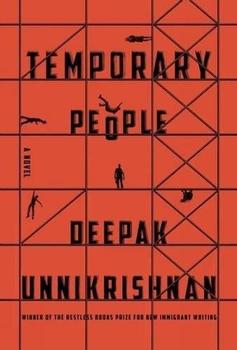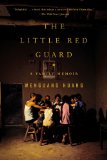Summary | Excerpt | Reviews | Beyond the book | Read-Alikes | Genres & Themes | Author Bio

In Pow!, Nobel Prize-winning author Mo Yan draws on his childhood in rural China to recreate life in a rustic community during the 1990s. The novel is narrated entirely by Luo Xiatong, a young man seeking to enter a monastic order. As part of this rite of passage he must tell his life's story to an ancient monk who listens impassively throughout. Luo describes his experiences growing up in Slaughterhouse Village, which evolved during his youth from a small settlement of farmers into China's number one meat processing facility. He intersperses his history with comments and observations about the present as he gets distracted by a festival taking place outside the temple. As the narrative progresses, the story becomes more and more fantastical until the past and present seem to merge.
The text relies heavily on oral tradition, and the chronicle feels very much like a fairy tale or bedtime fable. There are the kinds of digressions and repetition that one would expect from a master storyteller, the asides adding to the story's interest rather than detracting from it. In the process readers are treated to evocative depictions of Chinese customs. For example, one section describes funeral rites:
Father was sitting stony-faced behind a table on which lay a rice-paper accounts book. A brass ink box with a writing brush on top of it sat to the side. He accepted memorial gifts from a steady stream of people – cash or packets of yellow worship paper, a hundred sheets from some, two hundred from others – and entered them into his account book, while the Inspection Station's assistant head, Xiao Han, manning a squat table behind him, stamped the paper with the mark of an ancient copper coin, thus turning the paper into spirit money that could then be burnt for the deceased. Some people brought packets of actual spirit money issued by the 'Bank of the Underworld' and displaying the imagined likeness of King Yama, in denominations no smaller than a hundred million RMB. Picking up a billion-yuan note, Xiao Han said with a sigh, "Won't bills this big cause inflation down there?"
Mo Yan portrays day-to-day aspects of Chinese life throughout the novel – such as how impoverished families make ends meet, social customs, the obligations one has toward one's family, religious rites, business practices and communal celebrations.
For such a straightforward tale Pow! is surprisingly rich in quirky, well-developed characters. One gains a deep understanding of – and sympathy for – not only Luo Xiatong, but his strong-willed mother, long-suffering father, and Lao Lan, the corrupt village headman. Interspersed throughout is a full cast of eccentric individuals that provide most of the book's comic relief.
Mo Yan has often claimed he has no political ideology at all; in fact, in the book's afterword he says, "What about ideology? About that I have nothing to say. I've always taken pride in my lack of ideology, especially when I'm writing." Pow! does have a bit of a bite though; throughout the novel the author lampoons the corruption rampant in even small Chinese communities. In Slaughterhouse Village everyone takes part in the scams to enhance the village's economy (for example by injecting the animals to be slaughtered with water to increase the weight of the meat and with formaldehyde to enhance its color and maintain its freshness).
If I had to describe the plot in one word, that would be "earthy." The humor is somewhat crass, often relating to scatological or reproductive functions or body parts generally kept under wraps – the type of comedy that might be most appealing to a junior-high-age male. It's entertaining, but at times eye-rollingly gross. The subject matter, too, often drifts into territory that may be uncomfortable for some Western readers; many animals, including dogs, are slaughtered (and not even remotely humanely).
Although I liked Pow! quite a bit, I found the book a somewhat slow read. This wasn't because it was difficult in any way, but more because I didn't feel compelled to pick it up again after I'd set it aside. It's possible that the plot didn't progress quickly enough to hold my interest, or perhaps the scenes weren't varied enough for me to feel they moved the action forward. There is a seemingly endless amount of text about the joys of eating meat, and while this is central to the plot, it got tiresome after a while. Most readers will ultimately enjoy the novel, but I believe it's one that requires a bit of patience.
Regardless, Pow! is a worthwhile addition to any library, if for no other reason than its frame of reference, which is so foreign to most Western readers. The viewpoint it provides is likely to be quite enlightening to those unfamiliar with Chinese culture. I highly recommend the book to anyone interested in developing a better understanding of everyday life in this part of the world.
![]() This review was originally published in The BookBrowse Review in February 2013, and has been updated for the
October 2014 edition.
Click here to go to this issue.
This review was originally published in The BookBrowse Review in February 2013, and has been updated for the
October 2014 edition.
Click here to go to this issue.

If you liked Pow!, try these:

by Deepak Unnikrishnan
Published 2017
Until now, the humanitarian crisis of the so-called "guest workers" of the Gulf has barely been addressed in fiction. With his stunning, mind-altering debut novel Temporary People, Deepak Unnikrishnan delves into their histories, myths, struggles, and triumphs.

by Wenguang Huang
Published 2013
Three generations of a family living under one roof reflect the dramatic transformations of an entire society in this memoir of life in 20th century China.
Your guide toexceptional books
BookBrowse seeks out and recommends the best in contemporary fiction and nonfiction—books that not only engage and entertain but also deepen our understanding of ourselves and the world around us.